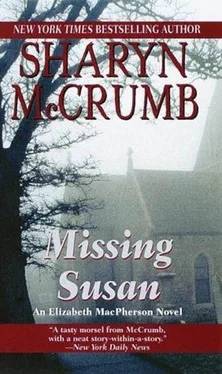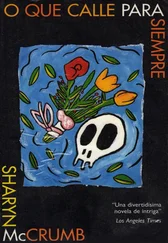Sharyn McCrumb - Missing Susan
Здесь есть возможность читать онлайн «Sharyn McCrumb - Missing Susan» весь текст электронной книги совершенно бесплатно (целиком полную версию без сокращений). В некоторых случаях можно слушать аудио, скачать через торрент в формате fb2 и присутствует краткое содержание. Жанр: Детектив, на английском языке. Описание произведения, (предисловие) а так же отзывы посетителей доступны на портале библиотеки ЛибКат.
- Название:Missing Susan
- Автор:
- Жанр:
- Год:неизвестен
- ISBN:нет данных
- Рейтинг книги:3 / 5. Голосов: 1
-
Избранное:Добавить в избранное
- Отзывы:
-
Ваша оценка:
- 60
- 1
- 2
- 3
- 4
- 5
Missing Susan: краткое содержание, описание и аннотация
Предлагаем к чтению аннотацию, описание, краткое содержание или предисловие (зависит от того, что написал сам автор книги «Missing Susan»). Если вы не нашли необходимую информацию о книге — напишите в комментариях, мы постараемся отыскать её.
Missing Susan — читать онлайн бесплатно полную книгу (весь текст) целиком
Ниже представлен текст книги, разбитый по страницам. Система сохранения места последней прочитанной страницы, позволяет с удобством читать онлайн бесплатно книгу «Missing Susan», без необходимости каждый раз заново искать на чём Вы остановились. Поставьте закладку, и сможете в любой момент перейти на страницу, на которой закончили чтение.
Интервал:
Закладка:
If that failed, there was always poison. But which one? Thallium was too slow and not completely reliable. Even the most doddering G.P. ought to be able to spot arsenic these days. Using lethal germs was out. He wasn’t such a fool as to risk contaminating himself. And the rest of the party, naturally, he amended, somewhat belatedly.
The real question, of course, was what could he get unobtrusively. Most of the Victorian murderesses got into trouble when their names appeared on a chemist’s poison register. He wouldn’t make that mistake. An inventory of the medicine chest might prove helpful.
He was mulling over the toxic possibilities of soaked cigarette butts (nicotine poisoning) when the telephone rang. He answered it at once, wondering what trouble the group had managed to get into on their own.
“Is that you, Rover?” said a familiar Yorkshire voice. “Not playing nursemaid this weekend?”
Rowan groaned to disguise the fact that he was moderately glad to hear from his fellow crime writer Kenneth O’Connor. Although O’Connor could be a nuisance-always coming unexpectedly to London and wanting to stay on the boat, when Rowan was planning to use it to entertain more nubile companions-he did have the virtue of being the only other crime expert of Rowan’s acquaintance who did not earn his living as a policeman. All the other crime historians had nasty suspicious minds which came of dealing with an unsavory element of society day after day in their police work. If Rowan asked them about a poison and then someone on his tour went and died of it, they might jump to the most uncomplimentary conclusions about his own character and motives. Even a perfectly executed accident after such a conversation with them might arouse suspicion. O’Connor, though, was usually too wrapped up in book deadlines and new projects to care who poisoned whom socially. Rowan decided that he could use a second opinion and Kenneth O’Connor was the ideal person to provide it.
“Good evening, Kenneth,” he said pleasantly. “I’ve just had a nice royalty statement on my third book. How are things with you?”
“Chaotic, as usual. I wanted to know if you’re going to be using your boat this week. I have to go to London to meet with those maniacs at the film studio-”
“And you infinitely prefer my hospitality to paying hotel rates?”
“I particularly enjoy your hospitality when you’re not there to dispense it in person, Rowan.”
“Well, as long as you’ve called, I have one or two questions for you.”
“I take it that this means I get the boat?”
“Yes, but if you put any more cigarette burns in the seat cushions, I’ll be using you for an anchor in future. Now-first question: do you know where Constance Kent lived?”
“Rode,” said Kenneth O’Connor without a moment’s pause. “Do I win a prize?”
“A box of chocolates from Christiana Edmunds,” snapped Rowan. A laugh from the other end of the phone told him that Kenneth recognized the name of nineteenth-century Brighton’s lovelorn lady poisoner. “Everybody knows Constance Kent lived near Rode, Kenneth. We want to know if the house is still standing. Can it be seen from the road? One of my tourists wants to go there.”
“I’ll see if I can find out for you. When will you be home again?”
“Monday night. There’s one other matter.”
“Yes?”
“One of the group fancies she’s a mystery novelist,” he lied. “Can you recommend a good poison?”
The next morning dawned sunny and warm, a fact observed by the mystery tour members at varying times between six and nine o’clock, when they either stumbled groggily or sprinted happily into the hotel dining room for breakfast. By ten o’clock everyone was fed and armed with sweaters, comfortable walking shoes, and credit cards, ready for an enlightening tour of Exeter.
Alice MacKenzie observed that for the first time on the tour, Elizabeth MacPherson was also carrying a pen and notebook. “Are you especially interested in Exeter?” she asked.
“It is Saturday morning,” said Elizabeth cryptically. “And Rowan is not within a hundred miles of here.”
A tiny and earnest-looking woman wearing a red blazer met them in the hotel foyer and introduced herself as Mrs. Lacey, their city guide. She captured Elizabeth’s attention at once by explaining that the hotel parking lot had been built on top of an old city plague pit. Elizabeth was still staring down wistfully at an immovable expanse of asphalt when the less ghoulish members of the party moved along toward the remains of the old city wall, just behind the hotel. As yet, she had written nothing in her notebook.
As they walked down the narrow lane that ended beside the cathedral green, Mrs. Lacey pointed out the well-preserved medieval houses, still in use, and began her recital of city history, beginning with the Roman occupation in 55 A.D.
“We will end our tour with the cathedral,” she explained as she led them past the West Front, with its beautiful carved Image Screen of saints. “It is within sight of your hotel and I am sure that you can all find your way back from there. Just now we will go to another quaint old street, where the BBC filmed some scenes in one of its Dickens dramatizations.”
This television reference set Susan off on a litany of her favorite British imports, and it took them another block and a half to shut her up.
As they walked through the bustling streets, Mrs. Lacey pointed out historic buildings, mentioning that the city was home to Sir Walter Raleigh, and that Queen Henrietta, wife of Charles I, had been sent here for safety during the Civil War. (Susan’s response in kind left the guide silently wondering who Hubert Humphrey was.)
“There was once a statue of Henry VII, but it was destroyed in the bombing in World War II. The statue was in honor of Henry’s entry into Exeter in 1497, after the city had withstood a siege by the pretender Perkin Warbeck.”
“The statue was never restored?” asked Martha Tabram, who probably chaired similar civic committees in Vancouver.
“Well, there is another statue of Henry,” said Mrs. Lacey. “I wouldn’t call it a restoration.” With some misgivings she pointed to a fiberglass image of a knight in armor on the façade of a department store.
Susan Cohen spoke up. “In Minneapolis we have an outdoor sculpture garden that has an enormous red cherry poised on the end of a giant spoon. It’s called the Spoonbridge, and it’s about twenty feet tall!”
Gravely the guide looked up at the fiberglass likeness of the first Tudor monarch. “Well,” she conceded, “I suppose it could be worse at that.”
They continued their walk through the crowded streets past the ruins of a church destroyed by Luftwaffe bombing and into a newer-looking part of the city, all built on the sites of the historic ones lost in the war. Finally they came to Princess Elizabeth Square, an open promenade lined with shops, newly constructed after World War II to replace the buildings destroyed by enemy bombing. “The present queen-Princess Elizabeth she was then-came down and dedicated the square as the first step toward the rebuilding of Exeter.”
During this part of the tour, Susan Cohen had little to contribute by way of comparison with her hometown, since Minneapolis had never been bombed by enemy forces. (Though certain members of the party were beginning to wish that it had.)
Elizabeth was scribbling furiously in her notebook, adding diagrams and arrows to her text. Alice leaned over to catch a glimpse of the writing, but she was unable to decipher it. The tour proceeded at a brisk pace, without shopping breaks, and without backtracking. Mrs. Lacey was a wealth of information on historic buildings, medieval celebrities, and dates. She said very little about the mercantile aspects of the city, past or present.
Читать дальшеИнтервал:
Закладка:
Похожие книги на «Missing Susan»
Представляем Вашему вниманию похожие книги на «Missing Susan» списком для выбора. Мы отобрали схожую по названию и смыслу литературу в надежде предоставить читателям больше вариантов отыскать новые, интересные, ещё непрочитанные произведения.
Обсуждение, отзывы о книге «Missing Susan» и просто собственные мнения читателей. Оставьте ваши комментарии, напишите, что Вы думаете о произведении, его смысле или главных героях. Укажите что конкретно понравилось, а что нет, и почему Вы так считаете.












